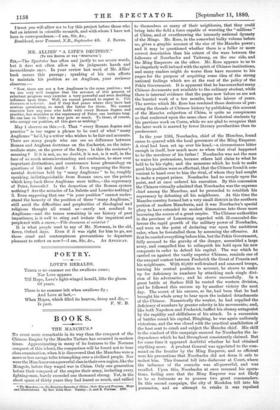MR. ALLIES' "A LIFE'S DECISION."
[TO THE EDITOR OF THE " SPECTATOR.1
Sra,—The Spectator has often and justly to use severe words, but it does not often allow in its judgments harsh and
inconsiderate ones. In your review last week of Mr. Allies' book occurs this passage ; speaking of his vain efforts to maintain his position as an Anglican, your reviewer observes :—
"Now, there are not a few Anglicans in the same position ; and we can very well imagine that the account of this process of reluctant progress may exercise a very powerful and even deciding influence upon them. Well, we cannot pretend to regret it. Vile damnum si exierint. And if they find peace where they have bad anxious questioning, so much the better for them. We cannot conceive how any man who holds with every Roman dogma and practice, but stumbles at the supremacy of Peter, can hesitate long. Ile can lose so little ; he may gain so much. To those, of course, who occupy our position, all this goes as nothing."
May I observe on this :-1. That " every Roman dogma and practice" is too vague a phrase to be used of what "many Anglicans " ho'd, by a writer who wishes to be fair and accurate. There are many people who can see no difference between Roman and Anglican doctrines on the Eucharist, on the inter- mediate state, on the power of the Keys. Is this the reviewer's meaning ? If it is not, as, no doubt, it is not, is it well, in the face of so much misunderstanding and confusion, to steer over important distinctions, and countenance loose phraseology on questions of life and death ? 2. Even supposing the Sacra- mental doctrines held by " many Anglicans " to be, roughly speaking, indistinguishable from Roman ones, are the points which keep back these Anglicans mere trifles,—the supremacy of Peter, forsooth ? Is the despotism of the Roman system nothing P Are the miracles of La Salette and Lourdes nothing 3. Even supposing that one "in your position" cannot under- stand the honesty of the position of these "many Anglicans," still amid the difficulties and perplexities of theological and
religious thought all round us—surely not confined to Anglicans—and the traces remaining in our history of past impatience, is it well to sting and irritate the impatient and perplexed with a sneer,—Vile damnum of, exierint ?
It is what people used to say of Mr. Newman, in the old, fierce, Oxford days. Even if it was right for him to go, are
those cruel and contemptuous provocations to departure pleasant to reflect on now P—I am, Sir, &c., AN ANGLICAN.


































 Previous page
Previous page